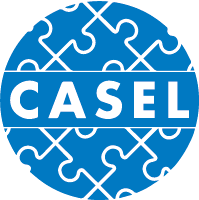The Story Behind the SSIS Collaborative
The SSIS System and its Evolution
Starting in 1985, Frank Gresham and Steve Elliott started collaborating to conduct social skills research. To advance their research, they invented the Social Skills Rating System (SSRS) (Gresham & Elliott, 1990) to assess and teach social skills empirically determined to be highly valued at school and in communities. The SSRS was published by American Guidance Service and is one of the most widely used multi-rater (student, teacher, & parent) assessment of children’s social skills. The SSRS has been used for more than two decades to advance strength-focused, positive assessments of children in thousands of schools and clinics around the world and advance research resulting in more than 1,300 published studies.
In 2008, Gresham and Elliott revised the SSRS and the Social Skills Improvement System (SSIS) was born. The system included multi-rater comprehensive behavior rating scales and a performance screening assessment that measured children’s communication, cooperation, assertion, responsibility, empathy, engagement, and self-control skills. The results from these assessment were linked to the SSIS Classwide Intervention Program (CIP; Elliott & Gresham, 2007), a classic manual-based treatment program implemented by either teachers or school psychologists. Researchers, in particular a team lead by James DiPerna, helped establish that the CIP was an effective intervention for improving elementary children’s social skills, decreasing many problem behaviors, and increasing academic engagement and achievement (DiPerna et al., 2015, 2016, 2018).
Inspired by the growing SEL movement, and in particular the work of CASEL (visit CASEL.org for more details), Elliott and Gresham showed that the social skills assessed by the SSIS Rating Scales and taught in the SSIS CIP were representative of the SEL competency domains in the CASEL Framework. As a result of factor analytic and related psychometric research with the Pearson Assessment team, the SSIS SEL Edition was born in 2017. This edition included a new screening assessment – the SSIS SEL Screening and Progress Monitoring Scales – a set of multi-rater SSIS SEL Rating Forms, and a fully digitized, web-based SSIS SEL Classwide Intervention Program. All of these resources are content aligned and designed to help educators advance understanding and development of children’s SEL skills in five competency areas: Self-Awareness, Self-Management, Social Awareness, Relationship skills, and Responsible Decision Making.
New research with the SSIS SEL assessments and intervention program continue. Specifically, a collaboration amongst two teams of researchers and a number of field-based practitioners are developing a set of very brief scales to better screen students’ SEL skill strengths and areas in need of improvement. Another effort is focused on expanding the skills taught in the CIP and also creating a version of this effective intervention program for use by parents.
To better support users – practitioners, parents, policy makers, and researchers — of the SSIS SEL family of products, we are collaborating with Pearson Assessment to offer this unique SSIScolab website to ensure (a) SEL CIP intervention resources are always available and secure, (b) cutting edge screening assessments are available and customizable, and (c) training resources and current research on SEL assessments and intervention program are easy to access.
Our Mission
The SSIS Collaborative’s mission is threefold:
- Support the practices and professional development of educators and psychologists who use SSIS assessment and intervention products.
- Support research and evidence-based practice initiatives committed to improving social, emotional, and academic functioning of children 3 to 18 years of age.
- Collaborate with colleagues to advance the development of promising assessments and intervention tools that contribute to a positive school climate and educational productivity of students.
Our Collaborations
Collaborating with others is part of our DNA and essential to advancing high-quality products, practices, and professional development. Our collaborations are with…..
Professionals who use the SSIS to enhance their efforts to assess and teach students social emotional learning (SEL) skills enable success at school and in their communities.
Researchers and Practitioners to advance SEL assessment, intervention, and program evaluation knowledge and skills needed to ensure high quality services to students.
Organizations that advocate nationally and internationally for high-quality SEL assessments and intervention programs for all students such as CASEL and Karanga.


